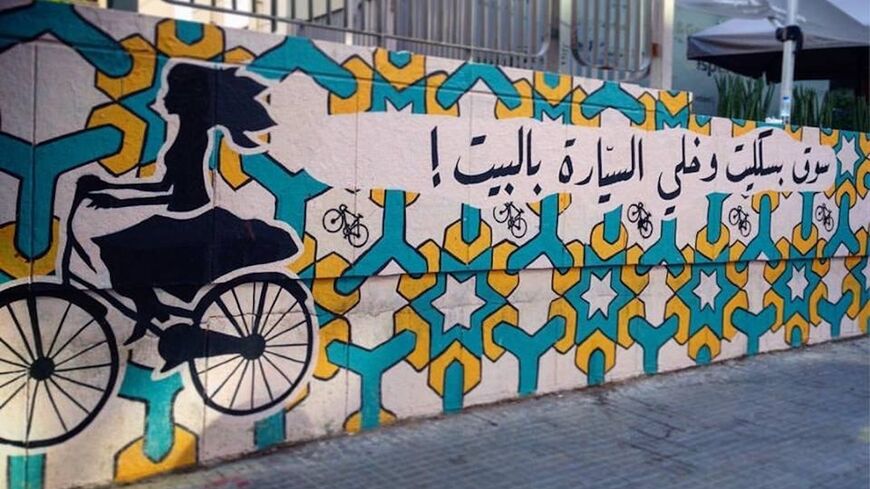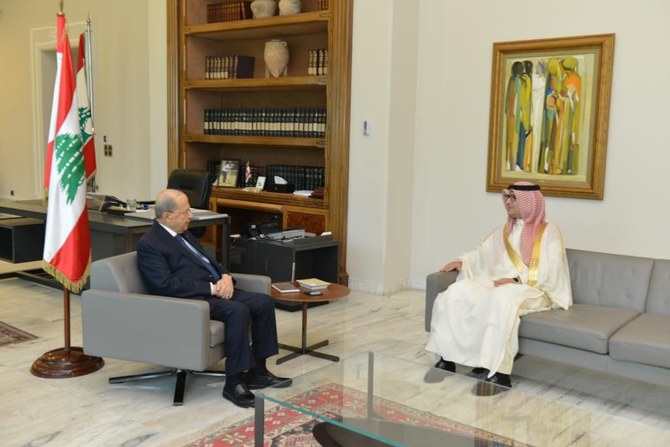by Soraya Ebrahimi — thenationalnews.com — Lea Salame is a Lebanese-born French journalist who was born on October 27, 1979. She escaped war …

By Clement Gibon -- almonitor.com -- BEIRUT — Faced with fuel shortages caused by the war in Ukraine, dozens of Lebanese drivers stuck in front of gas stations on Mar Mikhael Street wait impatiently to fill up their vehicles — a situation echoing last summer's “queues of humiliation.” As a consequence of the fuel shortage, many Lebanese have turned to bicycling — a less expensive and more environmentally friendly way of getting around. Ramzi Alieh, a young Lebanese architect, uses his bicycle to traverse Beirut. “I started cycling right away in Beirut … when the fuel crisis hit Lebanon. Thanks to this mode of transportation, I was much less affected by the shortage,” Alieh told Al-Monitor. “Now, with the war in Ukraine, mobility is becoming an issue again. Since I am already used to riding my bike, I don't have to worry about queues, rising fuel prices or expensive repairs,” he said.
In the space of a few months, the price of oil has increased drastically in Lebanon. While the price of diesel was 30,000 Lebanese pounds last June, it increased by 1,667% to 500,000 Lebanese pounds in April, which is almost the entire monthly salary of a Lebanese worker. For many, this increase in fuel costs added another burden to an already difficult daily life, said economist Patrick Mardini, head of the Lebanese Institute for Market Studies. “The war in Ukraine has led to an increase in the price of fuel worldwide. As a result, the price of transportation and fuel will become even more expensive in Lebanon,” Mardini told Al-Monit

By Sam Heller -- foreignpolicy.com -- For the last two and a half years, Lebanon’s economy has been in free fall. The country’s currency, the lira, has lost more than 90 percent of its value against the U.S. dollar; GDP has shrunk by nearly 60 percent; and close to 80 percent of Lebanese have slipped below the poverty line, along with practically all of the 1.5 million Syrian refugees living in Lebanon. Hundreds of thousands of people have fled the country.
The crisis, which is among the worst to hit any country in modern history, was precipitated by the collapse of what UN Secretary General António Guterres described as “something similar to a Ponzi scheme”: for years, the country’s central bank used ordinary bank depositors’ money to finance the corrupt and wasteful spending of successive Lebanese governments. Participants in the scheme reaped huge returns—until 2019, when it all came tumbling down. The pyramid scheme may not have been technically illegal, but it nonetheless amounted to corruption on a grand scale: Lebanese elites made a killing, spirited their ill-gotten gains abroad, and left millions of their impoverished countrymen holding the bag.
But the crisis wasn’t just caused by greed and corruption; it has been prolonged by the unwillingness of those who are responsible to change their ways or to assume their fair share of the country’s massive financial losses. International donors are willing to discuss a bailout that could right the economy, but Lebanese leaders have resisted even the most basic reforms that lenders have demanded as a precondition for a rescue package. The country’s political and financial elites have benefited handsomely from the current system, and they stand to lose from any ordered resolution of Lebanon’s national bankruptcy. According to the World Bank, Lebanon is now mired in a “deliberate depression,” one that has been “orchestrated by the country’s elite that has long captured the state and lived off its economic rents.”

Abu Dhabi, UAE (CNN) -- By Nadeen Ebrahim -- Lebanon's Prime Minister Najib Mikati is due to visit Saudi Arabia in the next two weeks, a first trip by a Lebanese premier to the Arab powerhouse in almost four years following an unprecedented rupture in relations. The last visit was in 2018 by then-Prime Minister Saad Hariri, who in 2021 stepped down nearly nine months after he was tasked with forming the country's government. One of Lebanon's biggest benefactors, Saudi Arabia's ties with Beirut had been progressively deteriorating over the past decade, a split fueled by Iran-backed Hezbollah's growing influence in the country. This came to head in 2017 when Hariri, once Saudi Arabia's main ally in Lebanon , resigned in a televised statement from Riyadh. Lebanese politicians said he was forced to take the decision after being detained in the kingdom. Hariri and Saudi Arabia denied those claims.
The tensions culminated in a break in relations in October following Lebanese information minister George Kordahi's open criticism of the Saudi-led coalition's war in Yemen. The comments were made before Kordahi took office, but Saudi Arabia and other Gulf states withdrew their envoys from Beirut after recordings of the criticism resurfaced. The minister subsequently resigned. Lebanon has for more than two years been suffering from a financial crisis the World Bank says is one of the world's worst since the nineteenth century. The Levantine country's woes have been further exacerbated by political wrangling, corruption and disputes over a delicate power-sharing system. Ties with Riyadh seem to be on the mend, however. Saudi Arabia and its Arab allies Kuwait and Yemen have said they'll re-instate their ambassadors in Beirut. The Saudi ambassador to Lebanon also hosted a Ramadan iftar banquet, which was attended by Lebanese leaders and former officials.
Do Saudi and Arab overtures to Lebanon point to a change of heart? And why now?
Khazen History


Historical Feature:
Churches and Monasteries of the Khazen family

St. Anthony of Padua Church in Ballouneh
Mar Abda Church in Bakaatit Kanaan
Saint Michael Church in Bkaatouta
Saint Therese Church in Qolayaat
Saint Simeon Stylites (مار سمعان العامودي) Church In Ajaltoun
Virgin Mary Church (سيدة المعونات) in Sheilé
Assumption of Mary Church in Ballouneh
1 - The sword of the Maronite Prince
2 - LES KHAZEN CONSULS DE FRANCE
3 - LES MARONITES & LES KHAZEN
4 - LES MAAN & LES KHAZEN
5 - ORIGINE DE LA FAMILLE
Population Movements to Keserwan - The Khazens and The Maans
ما جاء عن الثورة في المقاطعة الكسروانية
ثورة أهالي كسروان على المشايخ الخوازنة وأسبابها
Origins of the "Prince of Maronite" Title
Growing diversity: the Khazin sheiks and the clergy in the first decades of the 18th century
Historical Members:
Barbar Beik El Khazen [English]
Patriach Toubia Kaiss El Khazen(Biography & Life Part1 Part2) (Arabic)
Patriach Youssef Dargham El Khazen (Cont'd)
Cheikh Bishara Jafal El Khazen
Patriarch Youssef Raji El Khazen
The Martyrs Cheikh Philippe & Cheikh Farid El Khazen
Cheikh Nawfal El Khazen (Consul De France)
Cheikh Hossun El Khazen (Consul De France)
Cheikh Abou-Nawfal El Khazen (Consul De France)
Cheikh Francis Abee Nader & his son Yousef
Cheikh Abou-Kanso El Khazen (Consul De France)
Cheikh Abou Nader El Khazen
Cheikh Chafic El Khazen
Cheikh Keserwan El Khazen
Cheikh Serhal El Khazen [English]
Cheikh Rafiq El Khazen [English]
Cheikh Hanna El Khazen
Cheikha Arzi El Khazen
Marie El Khazen